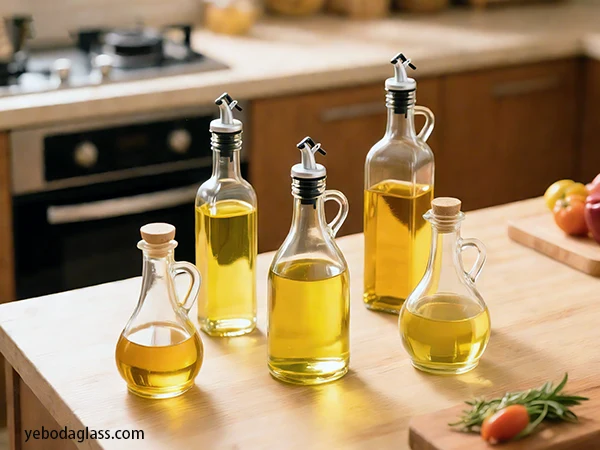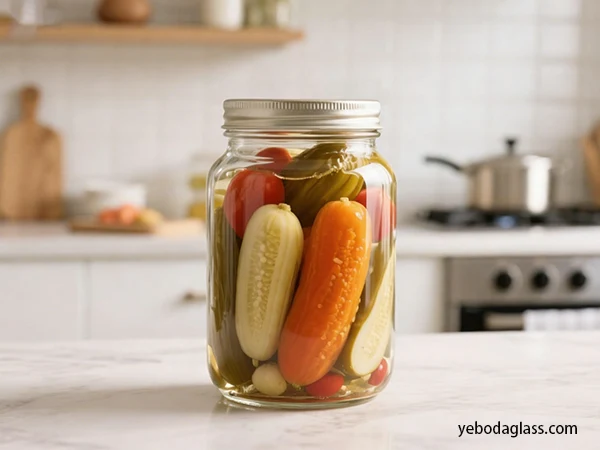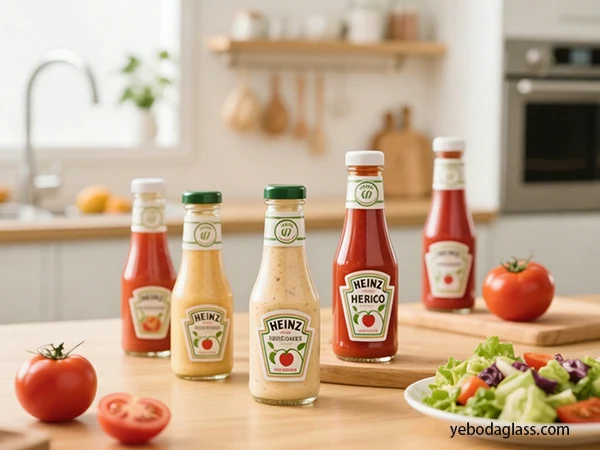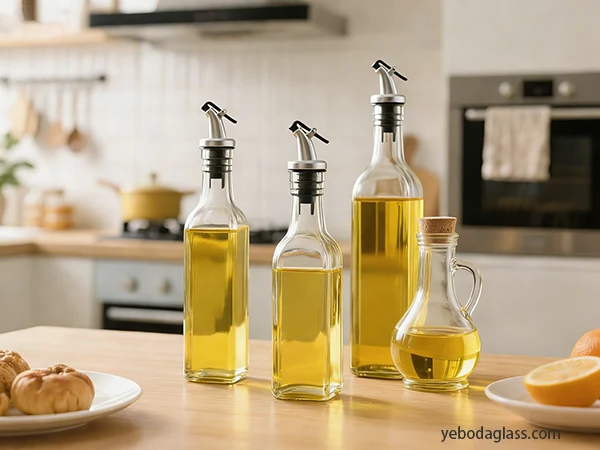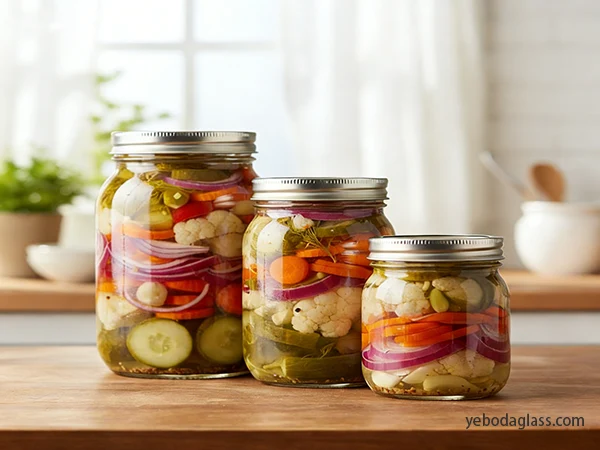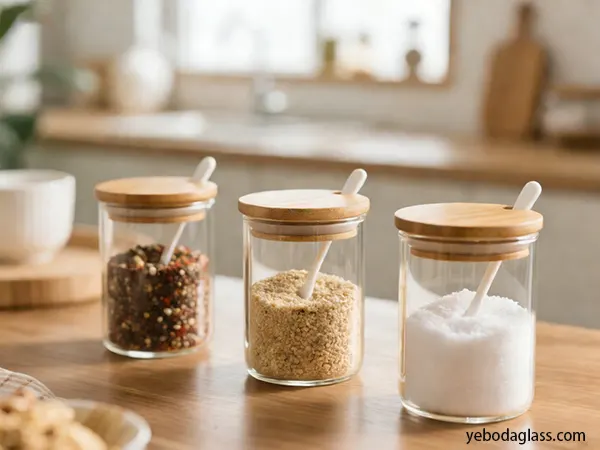介绍
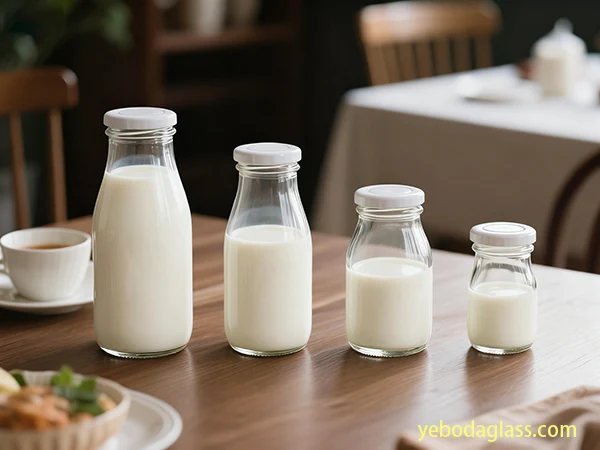
定制化战略框架
开发定制玻璃容器的战略路径——无论是标准饮料瓶, 玻璃牛奶瓶或者说,重新利用梅森罐式容器——这一切都始于一个至关重要的决定:
品牌应该对现有的库存容器进行定制,还是投资开发专属模具?
这一选择很大程度上受生产规模、品牌定位、监管限制以及所选生产合作伙伴或奶瓶批发商的经验水平的影响。对于中小规模买家而言,奶瓶批发商往往成为连接概念和执行的桥梁。
储藏容器表面装饰
表面装饰是进入市场的最简单快捷的方式。它利用工厂已生产或通过牛奶瓶批发网络分销的现有玻璃瓶或玻璃牛奶瓶的形状。
优势
- 无霉菌费用
- 最快上市时间
- 低起订量(非常适合新品牌或季节性产品上市)
缺点
- 有限的形状定制
- 外形尺寸可能与竞品相似
- 装饰性材料的耐久性因工艺而异。
由于表面定制在中小批量生产中效果非常好,许多品牌都依赖牛奶瓶批发商提供稳定的库存形状,然后通过丝网印刷、贴花或涂层进行装饰。
专有模具开发
采用专有模具打造独一无二的容器,使品牌能够完全掌控容器的几何形状、人体工程学和容量优化。
优势
- 对轮廓和结构设计拥有完全控制权
- 受保护的品牌资产
- 大批量生产可降低长期单位成本
缺点
- 初始模具成本高
- 开发周期较长(3-6个月)
- 需要较高的最低起订量(通常为 50,000 件以上)
生产规模作为战略决策驱动因素
- 低于1000件 → 仅限库存装饰
- 10,000–50,000 个单元 → 半定制或单腔模具
- 产量超过 10 万件 → 采用多腔模具的专用模具是最佳选择
牛奶瓶批发商在早期战略中的作用(以耶博达为例)
在第一阶段战略决策中,首要考虑因素之一是选择直接与工厂合作还是通过奶瓶批发商合作。在这一领域,作为领先的奶瓶批发商,叶博达具有显著优势:
- 一种结合标准形状和高级装饰的混合定制模式
- 已建立的工厂网络可将项目与合适的生产设施相匹配。
- 全面监管,包括模具开发、设计、质量控制和运输。
- 具备食品级玻璃牛奶瓶监管路径方面的专业知识
设计与工程:从概念到技术规范
一旦确定了战略,下一步就是将概念转化为可制造的规格。
材料科学与玻璃成分
大多数玻璃牛奶瓶和食品级玻璃瓶都采用III型钠钙玻璃制成。配方调整会影响玻璃瓶的颜色、耐热冲击性、化学耐久性和透明度。
着色剂
- 氧化铁 → 绿色调
- 钴 → 深钴蓝色
- 硒和镉化合物 → 红色和琥珀色
- 铬合金 → 橄榄色调
纯净与清澈
高端化妆品和优质饮料品牌可能需要:
- 低铁燧石玻璃,透明度极高
- 用于高档精华液的光学级化妆品打火石
- 用于特种饮料或乳制品的有色透明颜料

结构添加剂
- 氧化铝 → 提高耐久性
- 硼 → 具有更高的抗热冲击性(如硼硅酸盐)
结构设计及性能要求
玻璃牛奶瓶或广口瓶的设计必须兼顾品牌形象和功能可靠性。
脚跟、脚掌和冲击区域
加固的鞋跟半径和坚固的鞋底增强了鞋子的抗摔性和抗热循环性。
侧壁工程
均匀的壁厚对于以下方面至关重要:
- 保持结构完整性
- 防止薄弱环节
- 确保在加热/冷却过程中均匀收缩或膨胀。
颈部和闭合方式的兼容性
常见饰面包括:
- 38-400(玻璃牛奶瓶的常见规格)
- 48-400(果汁瓶)
- 70-450 或 86-400(广口瓶)
螺纹啮合、扭矩阻力和衬套兼容性在设计过程中都经过了精心设计。
模具制造、模具开发以及牛奶瓶批发商的角色
模具设计原则
吹吹
适用于窄口玻璃瓶。
按压式吹气
最适合广口罐和玻璃牛奶瓶,确保均匀分布。
模具材料
- 铸铁(标准)
- 青铜合金嵌件(用于提高导热性和表面光洁度)
原型设计工作流程
用于验证的3D打印模具
用于人体工程学和品牌评估。
首次取样单元模具
Single-cavity molds produce early samples checked by QC, engineering, and the milk bottle wholesaler before scaling.
Market Dynamics in Global Milk Bottle Wholesaling
Evolving B2B Packaging Expectations
Worldwide food and beverage industries are constantly changing their packaging requirements that challenge the milk bottle wholesalers not only to improve the durability, but also to increase the supply stability and produce more eco-friendly materials. Among other things, glass has become again a highly attractive material for packaging because it is fully recyclable, has an excellent food safety profile, and has a nice appearance. The transition has had a great impact on the wholesalers as a result they have been compelled to modernize their production methods, implement environment-friendly furnace technologies, and ensure strict quality testing so as to meet various regional regulations. So, it is a prerequisite for a contemporary milk bottle wholesaler to combine competitive prices with sophisticated technical standards if he/she wants to keep up with global markets that move very fast.
Influence of Regional Consumption Trends
The pattern of consumption in Asia, Europe, and Latin America is influencing different dairy brands to change their sourcing strategies. Regions where café culture is prevailing and fresh milk is delivered directly to consumers have a strong preference for glass bottles with thicker walls. On the other hand, emerging markets mostly demand lightweight versions that have been specially designed for transport optimization. What each milk bottle wholesaler is obliged to do now is to be able to easily switch between different mold sets, have multi-capacity product lines, and be capable of customizing quickly. Fast-response to changes in bottle opaqueness, neck finishing, and surface treatment has nowadays become the key factor to a firm’s success in getting hold of B2B contracts again and again.
Supplier Capabilities and Material Engineering
Advanced Glass Formulation and Structural Strength
Today’s suppliers are working on improved melting technologies and refined raw-material proportions through which they can upgrade the glass clarity, impact strength, and temperature resistance of the bottle. A proficient milk bottle wholesaler accomplishes the production by using top-quality silica, optimized annealing cycles, and automated surface inspection systems for identifying areas that are weak in the product. Not only are these technological improvements crucial to the companies who want reusable bottles with excellent strength, but also to those that seek to have thermal-shock capable bottles for their pasteurization lines.
品牌标识定制
Besides the structural aspects, brand owners are becoming more and more concerned about customization. This feature has significantly contributed to the brand’s decision to adopt the use of personalized embossing, different silhouette of the bottle, UV protective coating, and color glass option. A creative milk bottle wholesaler is obliged to provide such branding elements without production turnaround and without compromising the longevity of the bottles. Custom mold creation, digital design simulation, and fast prototyping are today’s standard ways for securing high-volume partnerships.
Logistics, Scalability, and Supply Chain Reliability
Inventory Planning and Bulk Fulfillment
Bulk distributors of dairy are very much dependent on the continuity of the supply of bottles. A well-prepared milk bottle wholesaler has large stockpiles of raw materials, fully automated palletizing systems, and real-time production scheduling in place so that he/she can limit the time of waiting. What really makes them capable is the coordination of multi-container shipments, mixed-capacity orders and packaging requirements that are region-specific. These are what make the supply chain stable and available for buyers who are from all over the world.
Global Shipping and Risk Management
In dealing with cross-border shipping problems, the main focus for the wholesalers should be on the optimization of the container loading patterns. It is also very important that they protect their containers more efficiently by using reinforced dividers, and at the same time, they should be cooperating with those freight partners who are very reliable. To lessen the impact of geopolitical and transportation risks, top wholesalers take certain measures such as port diversification, alternative transit route maintenance, and monitoring of global logistics data. This sturdiness leads to the absence of supply disruptions even during the periods of peak-demand, thus, putting the wholesaler in a position of a trusted long-term partner.

质量保证和法规遵从
Industry Certifications and Testing
Quality assurance has been the main factor in the decision of the choosing of any milk bottle wholesaler. Customers want more and more that the company they work with complies with FDA, LFGB, and EU food-contact standards. A good wholesaler goes about it by carrying out fully automated inspection, drop testing, thermal cycling, and stress-point mapping for confirming the structural reliability of the product. These steps make the bottle capable of being used in repeated washing, filling, and transport processes of modern dairy operations.
Documentation and Traceability
批次编码、数字化生产日志和成分认证等可追溯性措施在合规过程中扮演着至关重要的角色。领先的批发商会向客户提供完整的文档包,从而提高透明度,降低海关检查和审计期间的合规风险。这种高度的一致性有助于建立更牢固的长期信任关系,这对批发商成为不可或缺的全球供应链合作伙伴至关重要。
供应链、成本建模以及与牛奶瓶批发商的合作
供应链决定了生产之外的真实总拥有成本。
采购模式
工厂直销
成本最低,但对于缺乏经验的买家来说风险较大。
牛奶瓶批发商合作关系
当品牌缺乏内部工程支持时,牛奶瓶批发商就成为了项目集成商。如今,先进的批发商会协调以下工作:
- 模具设计
- 材料选择
- 艺术工程
- 装饰
- 质量控制审核
- 海关与物流
由于他们同时经营玻璃瓶和玻璃牛奶瓶,因此可以与多家工厂合作伙伴合作,实现规模化生产。这就是为什么许多品牌依赖牛奶瓶批发商,而不是自行处理这些复杂的环节。
综合成本模型: 仅仅关注单价是不够的。总到岸成本包含诸多因素。
| 成本构成 | 描述 | 低产量示例(1万件) | 高产量示例(10万台) |
|---|---|---|---|
| 模具成本 | 定制模具的一次性非重复性工程费用 (NRE)。 | $15,000 | 45,000 美元(多腔牙槽骨) |
| 摊销工具 | 模具成本分摊到单位产量中。 | 每单位 1.50 美元 | 每单位 0.45 美元 |
| 单位生产成本 | 工厂生产一个玻璃容器的价格。 | 每单位 0.60 美元 | 每单位 0.35 美元 |
| 装饰费用 | 印刷、蚀刻等成本(例如,双色丝网印刷)。 | 每单位 0.25 美元 | 每单位 0.18 美元 |
| 包装 | 主纸箱、隔板和托盘的成本。 | 每单位 0.10 美元 | 每单位 0.08 美元 |
| 运费及关税 | 海运/空运运费、关税和港口费。 | 每单位 0.20 美元 | 每单位 0.15 美元 |
| 总到岸成本 | 运送到您仓库的每件商品总成本。 | 每单位 2.65 美元 | 每单位 1.21 美元 |
物流管理: 玻璃材质本身较重且易碎,因此需要使用专门设计的包装(例如瓦楞纸板隔板、收缩膜托盘),并且搬运时也应格外小心。在规划库存时,您还应该考虑仓储成本、海运交货时间(4-6周)以及清关费用。
新兴技术与未来展望
轻量化进展
更先进的有限元分析建模技术能够实现重量更轻、强度不降低的容器。
高PCR含量玻璃
工厂越来越多地使用回收碎玻璃来减少能源消耗和环境影响。
按需数字印刷
未来十年可能会出现高速数码直喷玻璃印刷生产线,从而实现真正的大规模定制。
智能包装集成
二维码、NFC芯片和序列化批次跟踪将普通的玻璃牛奶瓶变成智能、可追溯的包装平台。

结论
定制玻璃瓶和玻璃牛奶瓶需要一套严谨的流程,从战略规划开始,贯穿工程设计,最终实现卓越的生产品质。无论品牌选择自有模具还是现有模具进行定制,合作伙伴的选择——尤其是选择合适的牛奶瓶批发商——都是商业成功的关键因素。经验丰富的牛奶瓶批发商能够提供设计支持、确保可生产性、管理质量控制,并将品牌与最高效的生产线对接。凭借合适的合作伙伴和规范的流程,品牌可以打造出独特、符合法规且性能卓越的容器,从而开拓全球市场。

